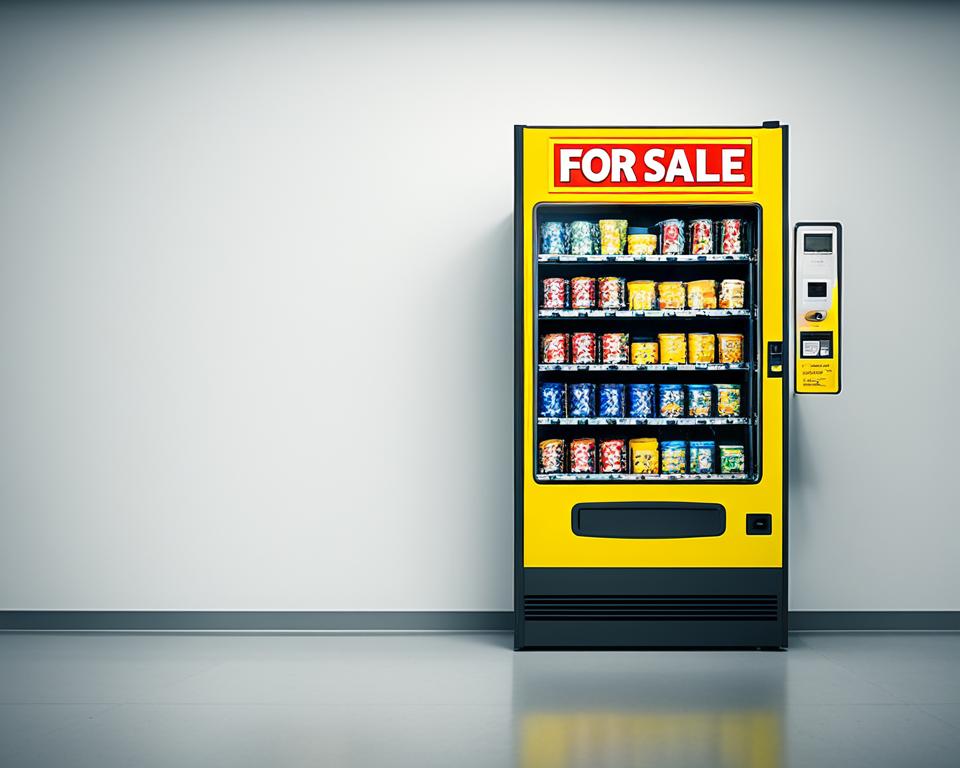Investing in a vending machine business can be a lucrative opportunity, as there are approximately 5 million operational vending units in the United States. Food and beverage vending machines hold the majority market share at 56%. Vending machines offer the flexibility to sell a variety of products, including healthy options. While the average vending machine generates around $5 per week, setting up multiple machines can help increase revenue. It’s essential to conduct detailed research, identify a niche, choose strategic locations, invest in customer service and vending management systems, source products in bulk, and maintain the machines properly to maximize profits. Startup costs for vending machines can range from $2,000 to $3,000 for mechanical machines and $3,000 or more for electronic machines.
Key Takeaways:
- Vending machines offer a flexible and potentially lucrative investment opportunity.
- Conduct detailed research and identify a niche to maximize profits.
- Invest in customer service, vending management systems, and proper maintenance.
- Consider startup costs, which range from $2,000 to $3,000 for mechanical machines and $3,000 or more for electronic machines.
- Setting up multiple vending machines can help increase revenue.
Table of Contents
Why Invest in a Vending Machine Business?
Investing in a vending machine business provides several advantages. It is a part-time opportunity that does not require special training, making it a flexible venture. Vending machines operate on a cash-based system, saving on labor costs as there is no need to hire employees. The National Automatic Merchandising Association (NAMA) estimates that vending machines generate around $20 billion annually in the United States. While individual vending machines may not bring significant profits, setting up multiple machines can be profitable. However, it is important to calculate the profit index by considering factors such as the unit price, cost of goods, overhead expenses, and maintenance costs.
| Advantages of Investing in a Vending Machine | Considerations |
|---|---|
| Part-time opportunity | Calculate profit index |
| No special training required | Unit price |
| Cash-based system | Cost of goods |
| Savings on labor costs | Overhead expenses |
| Potential for profitability with multiple machines | Maintenance costs |
Steps to Making Money with Vending Machines
To maximize profits in the vending machine business, it is crucial to follow specific steps. Here are the key actions you should take to ensure success:
1. Conduct Thorough Research
Prior to starting your vending machine venture, conduct thorough research to determine whether it is more cost-effective to purchase a new machine or an already operational one. Research the market demand for different types of vending machines and identify the most profitable opportunities.
2. Identify Your Niche
Identify a niche market and offer products that cater to the preferences and needs of your target audience. Consider providing healthy snack options, hot beverages, or specialized products that are in high demand.
3. Sell Popular Items
Include popular items such as snacks and beverages in your vending machine inventory. These products have a high chance of generating consistent sales and revenue for your business.
4. Strategically Place Your Machines
Maximize the visibility of your vending machines by strategically placing them in high-traffic areas such as shopping malls, bus terminals, and airports. These locations provide excellent opportunities for attracting customers and increasing sales.
5. Invest in Customer Service
Provide exceptional customer service to build trust and loyalty with your customers. Include contact information on your vending machines for customer feedback or inquiries. Promptly address any issues or concerns to ensure customer satisfaction.
6. Utilize a Reliable Vending Management System (VMS)
Invest in a reliable vending management system (VMS) to streamline your inventory management and revenue tracking processes. A VMS can help you efficiently monitor stock levels, track sales, and identify top-performing products.
7. Source Products in Bulk
Reduce costs and increase profit margins by sourcing products in bulk. Purchasing items in large quantities can help you negotiate better deals with suppliers and reduce overall expenses.
8. Maintain Your Vending Machines
Regularly maintain your vending machines to ensure they remain clean, functional, and attractive to potential customers. Implement a regular maintenance schedule for cleaning, restocking, and performing necessary repairs.
By following these steps, you can increase your chances of making money with your vending machine business and maximize your overall profitability.
Understanding Startup Costs
When venturing into the vending machine business, it’s crucial to understand the startup costs involved. These costs encompass more than just the initial purchase price of the machine itself. Let’s delve into the various factors that contribute to startup expenses:
Vending Machine Cost
The cost of a vending machine can vary depending on several factors, including the type, brand, size, and customization options. Mechanical vending machines typically range from $2,000 to $3,000, while electronic machines can cost $3,000 or more. It’s important to consider your budget and business goals when selecting the right vending machine for your venture.
Stocking Inventory
In addition to the vending machine cost, you’ll need to factor in the cost of stocking your machine with inventory. This includes purchasing the products you plan to sell, such as snacks, beverages, or other goods. Buying inventory in bulk can help reduce costs and maximize profits. It’s crucial to research popular products and identify those that align with your target audience’s preferences.
Installation Costs
If you plan to rent a space within an existing business for your vending machine, you may incur installation costs. These costs can include renting the space, installing the machine in a visible and accessible location, and ensuring that it meets safety and accessibility requirements. It’s important to consider any potential costs associated with acquiring and preparing a suitable location for your vending machine.
Permits and Licenses
Before starting your vending machine business, you may need to obtain permits or licenses depending on your local regulations. These costs can vary depending on your location and the type of products you plan to sell. It’s essential to research and comply with all legal requirements to operate your vending machine business legally.
By considering all these startup costs and budgeting accordingly, you can ensure a smooth start to your vending machine business. Understanding the expenses involved will help you make informed decisions and set realistic expectations for your venture.
Determining Pricing Strategy for Vending Products
Pricing vending products is a crucial aspect of maintaining profitability in the vending machine business. To ensure that your prices are competitive and allow for adequate profit margins, it’s important to follow a strategic approach. Here are some key considerations when setting prices for your vending products:
1. Cost-Based Pricing
One commonly used method is cost-based pricing, which involves pricing items at double the cost. For example, if a candy bar costs $0.52, it should be priced at $1.04. This approach helps cover expenses and ensures a decent profit for each sale.
2. Market Demand
While cost-based pricing provides a good starting point, it’s important to consider market demand when determining prices. Analyze the buying patterns of your target customers and adjust prices accordingly. If certain products are in high demand, you may be able to set slightly higher prices without affecting sales.
3. Incremental Pricing
Consider using quarter increments when setting prices for vending products. For example, instead of pricing an item at $1, you could price it at $0.75 or $1.25. This strategy allows for more precise pricing and may also enhance customer satisfaction by offering more affordable options.
4. Rounding Numbers
Rounding prices to whole numbers can also be effective in simplifying transactions and increasing sales. For instance, instead of pricing an item at $1.25, you can round it down to $1. Customers are more likely to hand over a single dollar bill rather than searching for change, making the transaction quicker and more convenient.
5. Regular Evaluation
Analyze the performance of your vending products regularly and evaluate your pricing strategy. Keep track of sales patterns, customer feedback, and competing prices in the market. Make necessary adjustments to stay competitive and ensure that your prices remain attractive to customers.
By considering these factors and regularly assessing your pricing strategy, you can maintain profitability and maximize the revenue generated from your vending machines.
| Benefits | Considerations |
|---|---|
| Ensures adequate profit margins | Market demand may fluctuate |
| Allows for cost coverage | Competitor pricing may affect sales |
| Enhances customer satisfaction | Regular evaluation and adjustments are needed |
| Simplifies transactions |
Regular evaluation and adjustment of pricing strategies can help maximize revenue.
The Advantages of Full-Service Vending
Full-service vending offers a convenient and hassle-free solution for businesses looking to provide snacks and beverages to their customers and employees. With full-service vending, businesses can rely on vending companies to handle the installation, maintenance, and stocking of the vending machines, eliminating the need to manage these tasks internally.
This option is especially beneficial for businesses that prioritize convenience and prefer to focus on their core operations without the added responsibilities of managing vending machines. By outsourcing the vending machine services to professionals, businesses can save time and effort while still offering a wide selection of products to their patrons.
One of the key advantages of full-service vending is that it eliminates the need for businesses to manually stock and repair the machines. Vending companies take care of regularly restocking the machines with popular and in-demand products, ensuring that customers always have access to their favorite snacks and beverages.
In addition, vending machine maintenance is also handled by the vending company, reducing downtime and ensuring that the machines are always in optimal working condition. Regular maintenance checks and repairs are conducted to prevent any issues or malfunctions that could disrupt the vending services.
Benefits of Full-Service Vending:
- Saves time and effort by outsourcing vending machine installation, maintenance, and stocking
- Eliminates the need for businesses to manually stock and repair the machines
- Ensures a continuous supply of popular and in-demand snacks and beverages
- Reduces downtime and ensures optimal machine performance through regular maintenance
By opting for full-service vending, businesses can provide their customers and employees with a convenient and hassle-free snacking experience while focusing on their core operations. The professional maintenance and stocking services offered by vending companies make full-service vending an attractive option for businesses seeking a seamless vending machine solution.
Conclusion
Investing in a vending machine business can be an incredibly profitable opportunity for entrepreneurs looking to maximize their profits. By taking the right steps and implementing effective strategies, individuals can ensure the success of their venture. Thorough research is essential to identify market trends, consumer preferences, and potential niche opportunities. This knowledge will guide the careful selection of products that cater to the target audience’s needs.
Strategic placement of vending machines in high-traffic locations, such as shopping malls, bus terminals, and airports, is crucial for attracting customers and increasing revenue. Furthermore, investing in exceptional customer service and robust inventory management systems ensures a seamless experience for customers and efficient operations for the business owner. By sourcing products in bulk, entrepreneurs can take advantage of cost savings, increasing profitability.
It is important to budget for startup costs, including the price of the vending machine, stocking inventory, and any additional expenses such as permits or licenses. Carefully evaluating pricing strategies is also vital to maintain profitability. By pricing products competitively, considering market demand, and regularly reviewing prices, entrepreneurs can optimize their revenue and attract more customers.
Whether opting for a full-service vending solution or managing the vending operations independently, investing in a vending machine business offers a flexible and potentially lucrative opportunity. With the right approach, entrepreneurs can tap into the growing market of vending machines and reap the rewards of a profitable and scalable business.


